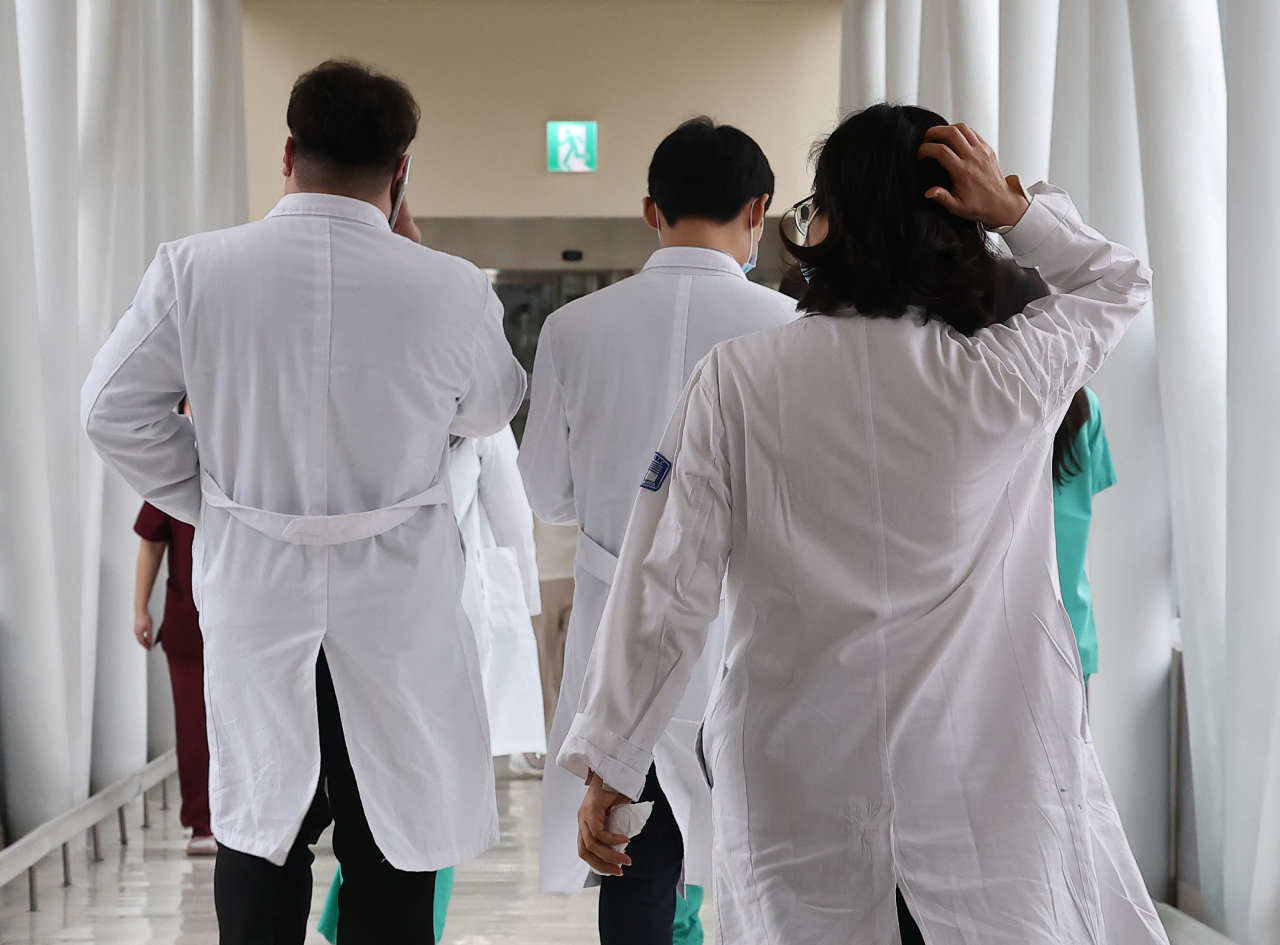Trainee doctors take collective action against gov't medical policy
By YonhapPublished : Feb. 19, 2024 - 19:38

Trainee doctors began submitting their letters of collective resignation Monday in protest against the government's plan to boost the number of medical students, while the health ministry ordered all of them to keep providing medical treatment.
Worries mounted as doctors warn of a large-scale strike and other responses in opposition to the government's decision to add 2,000 to the country's medical school enrollment quota next year, marking a sharp rise from the current 3,058 seats.
Although the government had initially played down the possibility of doctors' collective action, it is feared the nation will suffer substantial disruptions to its medical service, with some patients already experiencing delays in surgeries and other treatments in hospitals.
No major disruption in the country's medical service has yet occurred.
Interns and resident doctors at the country's five biggest hospitals, all located in Seoul, have agreed to submit letters of resignation by Monday and walk off the job starting at 6 a.m. the following day.
With large-scale walkouts by trainee doctors looming, Second Vice Health Minister Park Min-soo ordered all trainee doctors to keep providing medical treatment.
"From now on, the government issues an order for the provision of medical treatment to be maintained by the trainee doctors at all 221 training hospitals nationwide," Park told reporters.
"We are deeply disappointed in the situation where trainee doctors are refusing to work," Park said, "We earnestly ask the doctors to withdraw their decision to resign en masse and walk off their jobs."
The five major hospitals -- Asan Medical Center, Samsung Medical Center, Severance Hospital, Seoul National University Hospital and Seoul St. Mary's Hospital -- have played a key role in providing medical care for critical patients.
Trainee doctors at other general hospitals in Busan, Ulsan, Jeju, Gangwon Province, North Jeolla Province and Daejeon have also submitted their resignation letters.
In response, the government has taken steps to suspend medical licenses of two officials of the Korea Medical Association which represents doctors and leads their collective action.
If the two officials turn out to be urging doctors to join the collective action, their licenses will be cancelled, according to government officials.
The government says the increase in the admission quota is needed to address a shortage of doctors, particularly in rural areas and essential medical fields, such as high-risk surgeries, pediatrics, obstetrics and emergency medicine.
The number of doctors in South Korea relative to the size of the population is among the lowest in the developed world, according to health authorities.
But doctors have claimed that the government has not had full consultations on the matter and that the move would rather compromise the quality of medical education and services.
Concerns about a vacuum in medical services have already become a reality for some, as trainee doctors at Severance Hospital declared the suspension of their service on the day, prompting the hospital to go into emergency mode and adjust the schedules of surgeries and procedures for patients.
"The number of planned operations here has been halved," a Severance hospital official said. "We've been checking schedules and other situations."
The remaining four hospitals have also been notifying their patients of the possibility that their schedules will be adjusted.
Online websites for patients have already been flooded with posts by patients and their family members voicing concerns and complaints.
The country's health care system heavily relies on trainee doctors, as they play a key role in emergency and acute health care duties.
South Korea has around 13,000 trainee doctors across the country, and the number at the five biggest hospitals in Seoul came to about 2,745, or about 21 percent of the total.
Trainee doctors at the five hospitals account for about 40 percent of the total doctors there, according to government data.
Earlier in the day, Prime Minister Han Duck-soo said if doctors were to leave their hospitals or engage in collective action resulting in a vacuum in health care, the repercussions would primarily affect the public and could potentially harm emergency patients the most.
He added the government will deploy military doctors if the situation worsens, while planning to fully expand telemedicine services in case the doctors decide to push ahead with a massive walkout. (Yonhap)
More from Headlines
-
![NewsletterSubscribe
Start your day with a roundup of key stories from The Korea Herald with news and comment on all that’s happening in Korea.
[Robert J. Fouser] After the National Assembly election
1 out 3 Koreans live alone, family types becoming div](//res.heraldm.com/phpwas/restmb_idxmake.php?idx=652&simg=/content/image/2024/04/27/20240427050050_0.jpg&u=20240427115500) NewsletterSubscribe Start your day with a roundup of key stories from The Korea Herald with news and comment on all that’s happening in Korea. [Robert J. Fouser] After the National Assembly election 1 out 3 Koreans live alone, family types becoming div
NewsletterSubscribe Start your day with a roundup of key stories from The Korea Herald with news and comment on all that’s happening in Korea. [Robert J. Fouser] After the National Assembly election 1 out 3 Koreans live alone, family types becoming div -
 Meeting of president, opposition chief set to finally happen
Meeting of president, opposition chief set to finally happen -
 South Korea to launch space security center under spy agency
South Korea to launch space security center under spy agency















![NewsletterSubscribe
Start your day with a roundup of key stories from The Korea Herald with news and comment on all that’s happening in Korea.
[Robert J. Fouser] After the National Assembly election
1 out 3 Koreans live alone, family types becoming div](http://res.heraldm.com/phpwas/restmb_idxmake.php?idx=652&simg=/content/image/2024/04/27/20240427050050_0.jpg&u=20240427115500)




